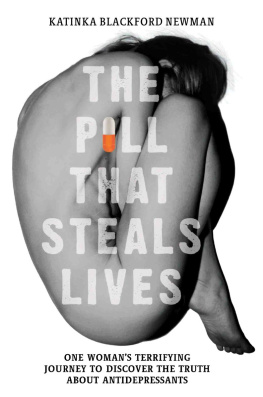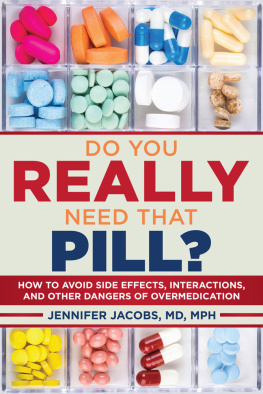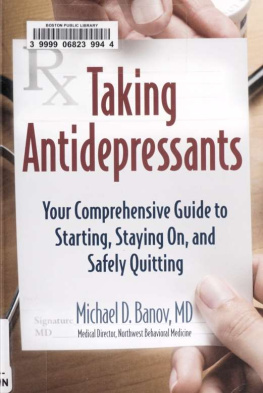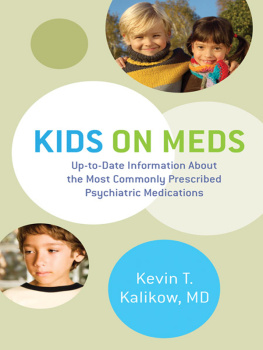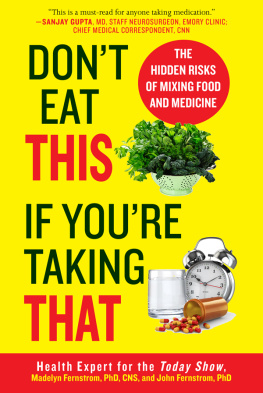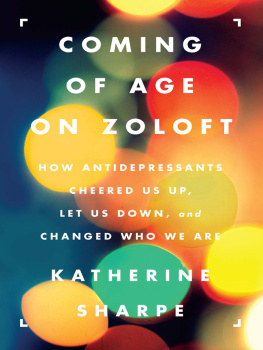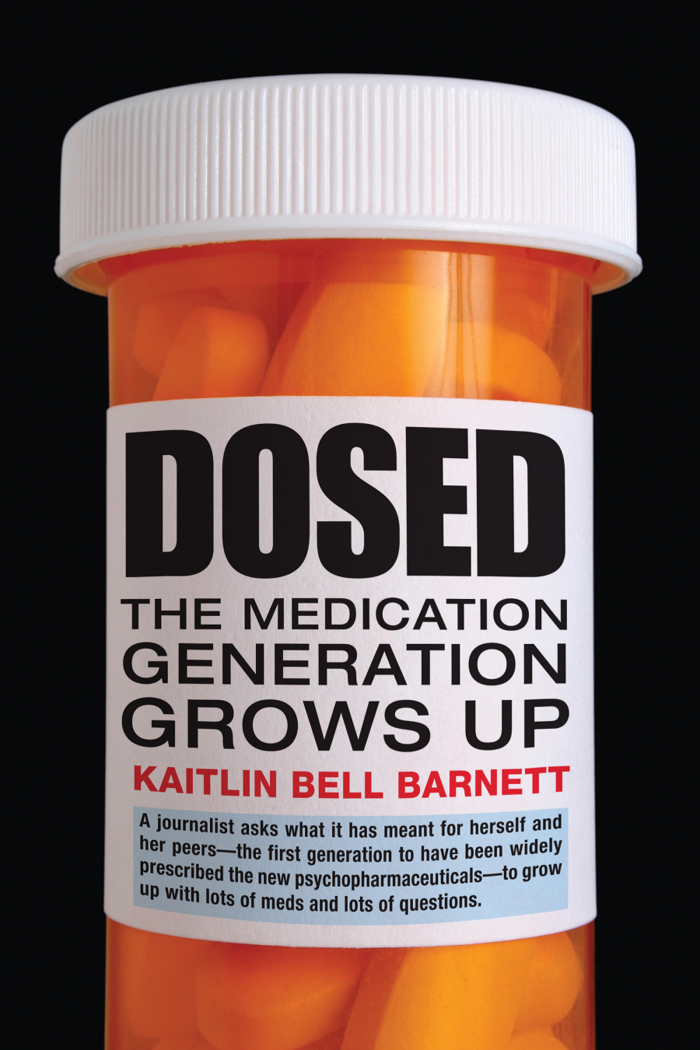Dosed
The Medication Generation Grows Up
KAITLIN BELL BARNETT
Beacon Press
Boston
To my parents,
who taught me to love stories
Introduction
I fall hard for coming-of-age stories, and my list of favorite books and movies contains many in this genre, from Pride and Prejudice to The Catcher in the Rye. The movie Garden State, which starred Zach Braff and Natalie Portman, also struck a chord with me when it came out in 2004. It dramatizes a few days in the life of Andrew Largeman, a twenty-six-year-old struggling actor in Los Angeles who returns to his native New Jersey for his mothers funeral. Andrew is nothing if not alienated: he feels disconnected from celebrity-studded Hollywood as well as from his old hometown, which he hasnt visited since leaving for boarding school nearly a decade earlier. For the first time in sixteen years, Andrew has stopped taking the psychotropic medications his psychiatrist father prescribed after ten-year-old Andrew caused an accident that rendered his mother a paraplegic. Like the illegal drugs his high school buddies take, Andrews meds serve as a metaphor for the feelings of inadequacy, disappointment, and rootlessness endemic to my generation of twenty-somethings. Judging from the films cult-hit success, its target audience of my peers apparently found the metaphor apt. When Andrew falls in love with a quirky, vibrant girl he meets in a doctors waiting room, she shows him how to reengage with his feelingsand the world. Presumably, he leaves the medications behind.
For several years, Garden State remained my favorite movie about my generation. It spoke to me as a young person growing up in turn-of-the-millennium Americathough not as a young medicated person. In fact, I completely forgot psychiatric drugs were even mentioned. Funny, because I myself have been taking medication since high school, and Garden State is one of just a couple of films I know of to allude to the psychological impact of growing up taking psychotropic drugs. But although it touches on this important phenomenon, the film never really examines its underlying assumptions that medications numbed Andrews pain and guilt, and that getting off them allows him once again to experience the agony and ecstasy of life.
For the first time in history, millions of young Americans are in a position not unlike Andrews: they have grown up taking psychotropic medications that have shaped their experiences and relationships, their emotions and personalities, and, perhaps most fundamentally, their very sense of themselves. In Listening to Prozac, psychiatrist Peter Kramers best-selling meditation on the drugs wide-ranging impact on personality, Kramer said that medication rewrites history. He was referring to the way people interpret their personal histories once they have begun medication; what they thought was set in stone was now open to reevaluation. What, then, is medications effect on young people, for whom there is much less history to rewrite? Kramer published his book in 1993, at a time of feverishand, I think, somewhat excessiveexcitement about Prozac and the other selective serotonin reuptake inhibitor antidepressants, or SSRIs, that quickly followed on its heels and were heralded as revolutionary treatments for a variety of psychiatric problems. For most people, I suspect, medications are perhaps less like a total rewriting of the past than a palimpsest. They reshape some of ones interpretations about oneself and ones life but allow traces of experience and markers of identity to remain. The earlier in life the drugs are begun, the fewer and fainter those traces and markers are likely to be. All told, the psychopharmacological revolution of the last quarter century has had a vast impact on the lives and outlook of my generationthe first generation to grow up taking psychotropic medications. It is therefore vital for us to look at how medication has changed what it feels like to grow up and to become an adult.
Our society is not used to thinking about the fact that so many young people have already spent their formative years on pharmaceutical treatment for mental illness. Rather, we focus on the here-and-now, wringing our hands about overmedicated kids. We debate whether doctors, parents, and teachers rely too heavily on meds to pacify or normalize or manage the ordinary trials of childhood and adolescence. Often, the debate has a socioeconomic dimension that attributes overmedication either to the striving middle and upper-middle classes, or to the social mechanisms used to control poor children and foster children. We question the effectiveness and safety of treating our youth with these drugs, most of which have not been tested extensively in children and are not government-approved for people under eighteen. We worry about what the drugs will do to developing brains and bodies, both in the short and long term. The omnipresent subtext to all this: what does the widespread drugging of minors say about our society and our values? Certainly, these questions are worth debatingeven agonizing over. But they ought not to constitute the be-all and end-all of our societys conversation about young people and psychiatric drugs, particularly with millions of medicated teens transitioning into adulthood. Too much of the discussion occurs in the abstract, and drugs too easily become a metaphor, as in Garden State, for a variety of modern societys perceived ills: the fast pace of life and the breakdown of close social and family ties; a heavy emphasis on particular kinds of academic and professional achievement; a growing intolerance and impatience with discomfort of any sort. Far too rarely, though, do we consult young people themselves. How do they feel about taking medication? How do they think it has shaped their attitudes, their sense of themselves, their academic and career paths, their lives? How do they envision medication affecting their futures?
Focusing on people who needed therapeutic intervention early in life and who continued to use medication for an extended period of time can help us get past the are-they-or-arent-they nature of the overmedicated kids debate. By assessing what medication has actually meant for my peers, I hope to get at something more intimate and more complex than either the psychotropic true believers or the total skeptics allow themselves to consider. A prescription becomes an event that generates fantasies, wishes, concerns, and meaning, write the social scientists Tally Moses and Stuart Kirk in an analysis of young peoples experiences of psychotropic meds. It structures ones own expectations and those of others in ways that are not necessarily intended or foreseen. As Moses and Kirk suggest, the experience of taking psychotropic drugs is more than just popping a pill, and these drugs often become a part of the self in ways children and teenagers could not have imagined when they swallowed their first dose. Now that the first generation of medicated kids is entering adulthood, we have an invaluable opportunity to hear about their experiences with psychotropic drugs, and their assessment of those experiences. In addition to looking at the family, medical, and educational circumstances in which drugs are prescribed and taken, that is what this book sets out to do.
My cohort lives with some powerful contradictions. On the one hand, we have grown up with the idea that prolonged sadness, attention problems, obsessions and compulsions, and even shyness are brain diseases that canand oughtto be treated with medication, just as a bodily disease like diabetes ought to be treated with insulin. The 1990s, sometimes called the Decade of the Brain, encompassed a period of unprecedented growth in understanding how the brain works, which generated enormous enthusiasm about the prospects for discovering the underlying mechanisms behind mental illness, enthusiasm that many say was overwrought and premature. Direct-to-consumer pharmaceutical advertising on TV, which the U.S. Food and Drug Administration authorized in 1997, has allowed drug companies to define the publics understanding of mental illness and psychiatric medicationsand this is especially true, I think, for young people who knew no other paradigm. Even as we grew up, though, immersed in the idea of an imbalance of particular brain chemicalsan outdated theory that has not held up to the sciencewe have inherited the American ideal of self-sufficiency, of solving ones problems through ones own resourcefulness. As weve sought to forge our identities, we have often struggled to reconcile the two.


